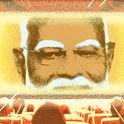Of all the bile to have been spewed over the Julie Myerson story—now reduced to a sub-Jungian archetype of how a blonde sorceress/novelist cast out her wayward son and conjured up book-sales by writing about it—the most pompous gob came from Libby Purves in Monday’s Times. “I would rather not have added to the verbiage,” she began. Now there’s a line for every columnist’s tombstone.
The Times ploughs on today (presumably uninterested in whether the story sells) with an interview with Myerson written by Janice Turner. Turner concedes that she is one of many columnists who have written about their children, though she now feels “revulsion” for the way Myerson has exposed her young son to the “media firestorm”—a firestorm into which Turner, with splendid lack of self-awareness, tosses her own cheap log.
Where is this line that those taking the moral high-ground have drawn, that so clearly distinguishes their confessional activities from those that Myerson pursues in her book? Libby Purves posthumously published her son’s writing in a book called The Silence at the Song’s End, after he committed suicide. She considers her tribute to her son to have been operating on an entirely distinct moral plane to Myerson’s, who also publishes her teenage son’s poetry in The Lost Child.
One detects, in both both Purves and Myerson, a deep need to reclaim children. This is what Freud called “abandoned object cathexis”: the urge to internalise what has been lost. Purves was naturally unable to gain her son’s consent to publish his writing. Myerson did get initial consent from her son, Jake, who then (hardly an unfamiliar reaction, this) changed his mind when approached by a newspaper reporter. Where’s the clear blue water between these cases? Purves, in a psychologically very peculiar statement, states that Myerson had “no right to claim ownership” over her son’s story. Come again? Purves clearly feels the contrast between her noble tribute to the dead with Myerson’s “monstrous” betrayal of the living, but—on the subject of ownership and permission—this is holier-than-thou drivel.
Tim Lott, a fine and usually honest writer, is another to have cast himself on the moral high ground and Myerson on the low. “Every time I have ever written a controversial narrative, I have approached the chief people being written about, shown them the finished article and insisted that they had the right to change anything they felt unfair,” he wrote in the Independent last week. Which is exactly what Myerson did with her son when preparing the manuscript of The Lost Child. Lott blunders on regardless, and describes what happened when he wrote about his own painful divorce. “After a row about something else, my wife withdrew her consent at the last moment. I allowed publication to go ahead.” And this distinguishes Lott from Myerson exactly how?
Of course, there are fine distinctions between the cases of Purves, Lott, Myerson, and all the rest of us who have, in one way or another, consigned difficult personal matters to print. Each case is unique to a unique set of circumstances. But what is it that lends Lott and Purves such piety and certainty? Freud had another memorable phrase to explain the extreme judgements people in similar conditions pass on one another: the “narcissism of small differences.” To resort to more homely proverbialisms—there are lots of glass houses in this case, and these writers should not be so eager to throw stones. They are all, one way or another, in the same confessional boat. They should at least leave the condemnations to those who have the only truly clear and coherent argument: that private matters should remain private, and that no-one should write about messy, difficult relationships. It’s an uninteresting and unlivable argument, but it is consistent.
Those of us who traverse the public-private border should know that we’re all gambling with the same slot machine. I dropped my penny’s worth into the Observer at the weekend, first because I thought commentators should actually read the book before assailing Myerson, but also because I think there is value in trying to tell true and honest stories, especially when the circumstances are hard. There are risks involved in all such cases, of course, and Jake Myerson’s angry, contradictory reactions have made those risks all-too evident. Perhaps Julie Myerson shouldn’t have taken that risk, but perhaps what she has done is both brave and right. How did everyone get so certain?
What I really don’t understand is the toxically bitchy line of attack, expressed over and again, that Myerson has been acting as “a writer first and a mother second.” My grandfather, Eric Linklater, was an extremely prolific writer, with somewhat Victorian attitudes. He wrote three autobiographies, in which he described himself a very great deal, and his children almost not at all. He was most certainly a writer first and a father second. But it would have occurred to no-one in the 1940s or 1950s to consider that odd, or even to make that observation. When it comes to a mother, however, people clearly feel free to fling the doors wide open and release the hyenas.
Julie Myerson is both a writer and a mother. As part of being a modern, providing matriarch, she has written about motherhood. This is the kind of thing we now take for granted that writers do. For a couple of years, she also wrote about her family anonymously for the Guardian, in a column called “Living With Teenagers,” which was very popular. The story of her son is the stuff of contemporary life, and it is familiar to most of us. But now every columnist wants to howl his or her horror at the “chattering class” awfulness of Myerson’s still largely unread book.
Is it good or bad for Jake that his mother has written about his drug-use? How the hell do these commentators know? And, if they are so sure it’s bad for him, why are they making it worse? Do they think Jake is grateful to them for pouring their hate onto his mum? Myerson’s writing may be legitimately criticized, but those people should at least still do so after—rather than before—reading her book, which Bloomsbury has now rushed onto the shelves today. What of her qualities as a mother? I have no idea. My very limited experience of mothers tends me to think that this is a rather complex call to make.
I would hate to judge whether Libby Purves or Janice Turner have been good mothers. But I am perfectly willing to offer a view that their writing—along with much of the verbiage of the last week—has been tawdry, pious and hypocritical.
Hating Julie Myerson: the narcissism of small differences
March 11, 2009

The book no-one needed to read to know all about…











